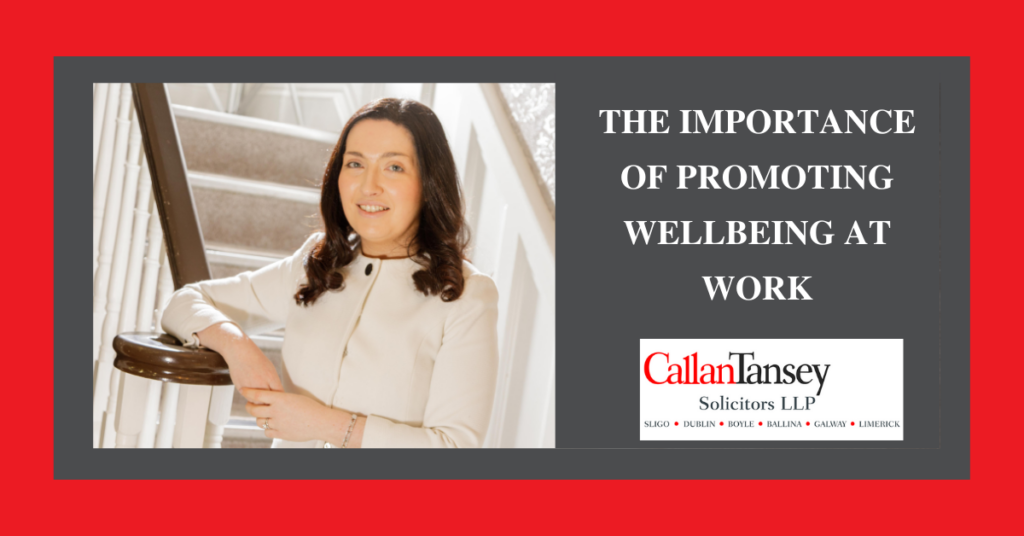Health and wellbeing have been recognised as a key resource for people to realise their potential, to achieve important life goals and to contribute to society. Recognising this the Law Society has introduced a Professional Wellbeing Charter to support workplace wellbeing.
What is the Law Society Professional Wellbeing Charter?
The Law Society of Ireland has invited firms across Ireland to show their commitment to workplace wellbeing by becoming a signatory of the Law Society Professional Wellbeing Charter. The Charter is committed to the wellbeing of all members and the creation and maintenance of positive workplace cultures that support wellbeing and psychological health.
Why have Callan Tansey Solicitors become a signatory?
We are delighted to be one of the first firms to become signatory of the Law Society Professional Wellbeing Charter which we feel is a public commitment to our staff and our clients. We believe that promoting the wellbeing of our staff is critical in the successful operation of a busy legal practice. Our staff are our most valuable asset and any steps we can take to support and encourage their wellbeing and psychological health is our main priority. As Richard Branson once remarked “Take care of your employees and they will take care of your business. It’s as simple as that”.
What are the benefits for our clients?
We believe that committing to the Law Society Professional Wellbeing Charter will also result in added benefits to our clients. Our legal practice operates at very fast pace and by supporting and promoting wellbeing we believe that our team will bring added benefits to our clients in the legal services we provide throughout the various Departments within Callan Tansey. There are of course added pressures with remote working and the inability for staff to mix as we once did and with that in mind a commitment to all our wellbeing is particularly crucial now. This is a difficult time for everyone and we believe that by showing our public commitment we can support our staff through the current restrictions and build the framework for a more positive workplace culture promoting wellbeing. This then enables us to more fully support our clients as they address the challenges they are facing.
By signing the Law Society Professional Wellbeing Charter what have we committed to?
By becoming a signatory of the Law Society Professional Wellbeing Charter, we commit to improving leadership and championing behaviours that promote and enable professional wellbeing across all roles in our workplace both virtual and physical. Work to create a healthy workplace culture characterised by behaviours and practices that promote effective communication and active listening, so the office experience is one of trust, respect, honesty, fairness, compassion and psychological safety. The key elements of the Professional Wellbeing Charter are:
- Build an environment where leaders promote professional wellbeing and take appropriate action to protect employees’ mental health including holding unprofessional behaviours to account, with consequences.
- Work to reduce stigma associated with mental health in the workplace.
- Build employee and management capacity to support employees’ psychological and mental health concerns and be able to respond effectively to these as needed.
- Strive to create a work environment where tasks and responsibilities can be accomplished within a realistic timeframe and that promotes work/life balance.
- Encourage and support employees in the development of their social and emotional needs, as well as their job skills.
- Nurture a work environment where employees derive a sense of meaning and purpose from their work and are appropriately recognised and rewarded for their work efforts.
- Ensure policies, procedures and processes are in place that safeguard employee psychological safety and mental health.
Caroline McLaughlin, Partner at Callan Tansey, adds “We would encourage all legal practices in Ireland to join us in becoming a signatory to the Professional Wellbeing Charter to show their commitment to their own wellbeing and psychological health and to all people across all roles within their organisation. Our health is our wealth and now more than ever we need to protect it. “

